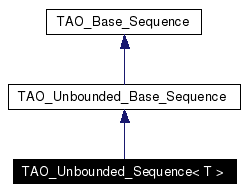
#include <Sequence_T.h>
Inheritance diagram for TAO_Unbounded_Sequence< T >:


Public Member Functions | |
| TAO_Unbounded_Sequence (void) | |
| Default constructor. | |
| TAO_Unbounded_Sequence (CORBA::ULong max) | |
| Constructor using a maximum length value. | |
| TAO_Unbounded_Sequence (CORBA::ULong max, CORBA::ULong length, T *data, CORBA::Boolean release=0) | |
| TAO_Unbounded_Sequence (const TAO_Unbounded_Sequence< T > &) | |
| Copy constructor. | |
| TAO_Unbounded_Sequence< T > & | operator= (const TAO_Unbounded_Sequence< T > &) |
| Assignment operator. | |
| ~TAO_Unbounded_Sequence (void) | |
| Dtor. | |
| T & | operator[] (CORBA::ULong) |
| operator [] | |
| const T & | operator[] (CORBA::ULong) const |
| operator [] | |
| virtual void | _allocate_buffer (CORBA::ULong length) |
| Implement the TAO_Base_Sequence methods (see Sequence.h). | |
| virtual void | _deallocate_buffer (void) |
| Must deallocate the buffer and then set it to zero. | |
| T * | get_buffer (CORBA::Boolean orphan=0) |
| const T * | get_buffer (void) const |
| void | replace (CORBA::ULong max, CORBA::ULong length, T *data, CORBA::Boolean release=0) |
Static Public Member Functions | |
| T * | allocbuf (CORBA::ULong) |
| Allocate storage for the sequence. | |
| void | freebuf (T *) |
| Free the sequence. | |
This class completes the implementation for TAO_Base_Sequence for the unbounded case.
|
||||||||||
|
Default constructor.
|
|
||||||||||
|
Constructor using a maximum length value.
|
|
||||||||||||||||||||||||
|
Constructor using the data and memory management flag. Memory *must* be allocated using the ::allocbuf static method, since in the future this classes may use a global ACE_Allocator. |
|
||||||||||
|
Copy constructor.
|
|
||||||||||
|
Dtor.
|
|
||||||||||
|
Implement the TAO_Base_Sequence methods (see Sequence.h).
Implements TAO_Base_Sequence. |
|
||||||||||
|
Must deallocate the buffer and then set it to zero.
Implements TAO_Base_Sequence. |
|
||||||||||
|
Allocate storage for the sequence.
|
|
||||||||||
|
Free the sequence.
|
|
||||||||||
|
This function allows read-only access to the sequence buffer. The sequence returns its buffer, allocating one of one has not yet been allocated. No direct modification of the returned buffer by the caller is permitted. |
|
||||||||||
|
Allows read-write access to the underlying buffer. If <orphan> is FALSE the sequence returns a pointer to its buffer, allocating one if it has not yet done so. The number of elements in the buffer can be determined from the sequence <length> accessor. If the <orphan> argument to <get_buffer> is FALSE, the sequence maintains ownership of the underlying buffer. Elements in the returned buffer may be directly replaced by the caller. For sequences of strings, wide strings, and object references, the caller must use the sequence <release> accessor to determine whether elements should be freed (using <string_free>, <wstring_free>, or <CORBA::release> for strings, wide straings, and object references, respective) before being directly assigned to. If the <orphan> argument to <get_buffer> is TRUE, the sequence yields ownership of the buffer to the caller. If <orphan> is TRUE and the sequence does not own its buffer (i.e., its <release> flag is FALSE), the return value is a null pointer. If the buffer is taken from the sequence using this form of <get_buffer>, the sequence reverts to the same state it would have if constructed using its default constructor. The caller becomes responsible for eventually freeing each element of the returned buffer (for strings, wide string, and object references), and then freeing the returned buffer itself using <freebuf>. |
|
||||||||||
|
Assignment operator.
|
|
||||||||||
|
operator []
|
|
||||||||||
|
operator []
|
|
||||||||||||||||||||||||
|
Allows the buffer underlying a sequence to be replaced. The parameters to <replace> are identical in type, order, and purpose to those for the <T *data> constructor for the sequence. |
 1.3.9.1
1.3.9.1